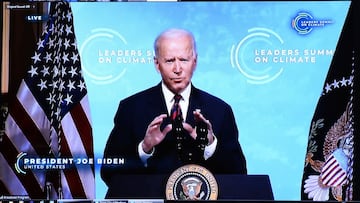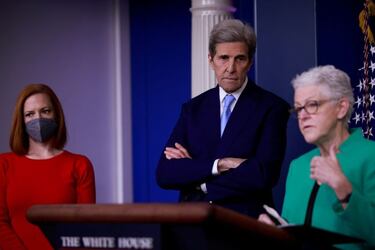What has Biden proposed at the global climate summit?
President Joe Biden called climate change ‘the existential crisis of our time’ as he announced to the world the US plan to reduce greenhouse gas emissions.

It's ‘the existential crisis of our time' said the President of the United States on Thursday as he addressed other world leaders. And his words included aggressive promises which included a boost to public climate finance to help poor countries reduce greenhouse gas emissions and adapt to a changing climate, while doubling funding by 2024 from high average levels hit during the Obama administration.
Biden wants US to lead on climate change
The White House said it was embracing "ambitious but attainable goals" for international aid to developing countries, given the urgency of the climate crisis and to compensate for a sharp drop in US funding during the Trump administration.
- US stimulus checks: latest news
- People are still waiting for their third stimulus check
- Fourth stimulus check: will new payment be larger?
- A brief history of how Earth Day came to be
- Why has the demand for vaccines decreased in some states of the country?
The White House said that by 2024 it would triple financing of climate adaptation, which focuses on adjustments to current or expected climate change. It said it would work with Congress to enact needed legislation.
The Biden administration released its climate finance plan in tandem with a new goal to cut emissions by 50%-52% from 2005 levels.
Leonardo Martinez-Diaz, a top aide to Biden's climate envoy John Kerry, said total US international public climate finance averaged around $2.8 billion a year during the baseline period from fiscal 2013-2017, with around $500 million going toward adaptation. That was the most recent period when US climate finance was at an all-time high, he said on Twitter.
A handful of nongovernmental organizations said on Thursday the United States, the world's second leading emitter after China, would have to contribute $800 billion in international climate finance through 2030 for its "fair share."
Today I’m bringing together leaders from around the world to meet this moment of climate peril, and extraordinary opportunity. No nation can solve this crisis on its own, and this summit is a step on a path to a secure, prosperous, and sustainable future. https://t.co/lcUUsgyEo3
— President Biden (@POTUS) April 22, 2021
"The United States has an obligation to provide finance and other forms of support to enable emissions cuts in poorer countries, and to ensure that frontline communities in those countries can survive the climate impacts that are already happening," said Niranjali Amerasinghe, executive director of ActionAid USA.
In a fact sheet on the climate finance plan, the White House said US agencies, working with development partners, would prioritize climate in their investments, expand technical assistance and increase funding for adaptation and resilience.
It said the US Agency for International Development (USAID) would release a new Climate Change Strategy in November 2021, at the 26th Conference of the Parties to the United Nations Framework Convention on Climate Change (COP26).
USAID said it would leverage $250 million in federal funding to attract $3.5 billion in private sector financing for climate-related work over the next three years, and aimed to sharply scale up climate finance programs in 20 fast-growing economies.
The US International Development Finance Corporation (DFC) would change its development strategy to include climate for the first time, and prioritize climate mitigation and adaptation.
The Millennium Challenge Corporation's new climate strategy would focus on climate-smart development and sustainable infrastructure, aiming to put more than 50% of its funding into climate-related investments over the next five years, it said.

The US Treasury, which this week named a climate czar, would direct US executive directors in multilateral development banks such as the World Bank to ensure they set and applied ambitious climate finance targets and policies.
Related stories
The plan also calls for ending international investments in carbon-intensive fossil fuel-based energy projects, and steering capital toward climate-aligned investments, a goal long sought by environmental groups.
Treasury, together with the Organisation for Economic Co-operation and Development, will spearhead efforts to modify guidelines for official export financing to reorient financing away from carbon-intensive activities, it said.

